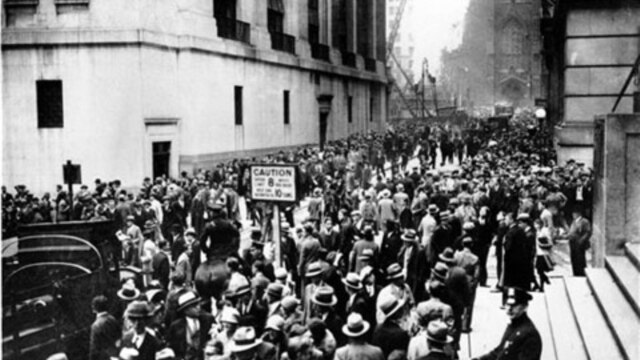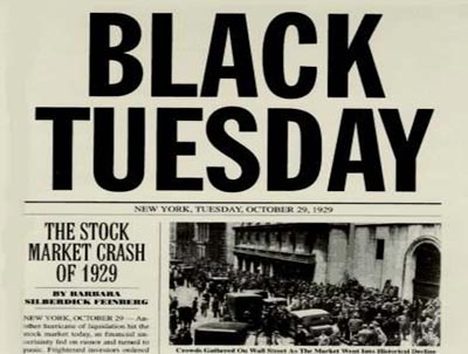Hoover reaction to stock market crash
Hoover had long criticized speculation on the stock market. He had repeatedly asked President Coolidge to seek additional control over private banking and financial practices, especially insider trading and the use of common stocks as security at near-market value for customers' deposits.
He also urged Federal Reserve Board members to restrict credit sufficiently to deter speculation. The board pursued confused objectives and showed faulty logic, dropping the re-discount rate, to Hoover's horror, to 3. There was little that Hoover could do to restrain stock speculation when he entered office in March He wrote a statement for a reluctant Secretary of the Treasury Andrew Mellon to issue, saying that conservative bonds, in contrast to speculative stocks, were undervalued.
Great Depression - Wikipedia
Fearing that an assault on the speculative market could start a panic, he was cautious about recommending a rise in the rediscount rate in that year.
But probably nothing Hoover could have done would have averted the stock market crash of October There were few historical parallels for Hoover to draw on.
By late-twentieth-century standards, Hoover reacted slowly to the crisis; by earlier guides he was a remarkable activist.
His initial response was to persuade management to maintain wages and to urge a pooling of resources on the part of financial interests to prevent further deflation. Groups of industry and labor representatives came to Washington at the president's invitation, and both took action to try to avert serious trouble, but to no avail. Hoover and the American Economic Association both anticipated a healthy deflation to be followed soon by a business revival.
Why EVERY generation gets financially destroyed by a stock market crashWhen the depression reached worldwide dimensions toward the end of , Hoover failed to respond freshly to the crisis. He relied principally on increased public works and a balanced budget—timid answers to what by was obviously a disaster.

Hoover promised in February that if hunger and suffering could not otherwise be prevented, "I will ask the aid of every resource of the Federal government. Establishment economic thinking was wary of relief as being unproductive, and Hoover feared that it would bring hordes of subsidy seekers.
Great Depression Definition | Investopedia
But he had other reasons for his hesitancy to provide extensive federal relief, and they were of a different sort from those that much historical scholarship has attributed to a cold and reactionary Hoover. In the years before his presidency, Hoover had spent considerable energies in some of the most extensive humanitarian relief in history. Then, acting out of his Quaker faith and upbringing, he had looked to voluntary, rational acts of compassion and social reformation on the part of the spiritually enlightened.
Hoover, it seems, believed that in times of crisis, citizens would take this kind of initiative. It was, then, not only the will of the recipients of relief that would suffer—and Hoover was not given to the right-wing notion that the poor have themselves to blame—but the will of the property holders, who were supposed to behave as Hoover and his volunteers had behaved in days of famine abroad.
Hoover's trust in the generosity and initiative of his fellow citizens was naive, and had he not finally come around to provide some federal aid and then been replaced by the New Deal, it might have proved disastrously naive. But the sharing that he wanted from the citizenry was not so very far from what the democratic left envisions within a workers' democracy.
In the years since, when the values of privacy came to be extolled above the virtues of public citizenship, Hoover's belief in the reality of cooperativeness had evidently become only a poignant memory. It is not inconceivable that Hoover's hesitancy in the face of the depression represented the drag of the past upon the politics of the moment and the sluggishness of prevalent institutions in their first encounter with economic collapse.
Hoover had been sympathetic toward the progressive movement, and a vigorous response to the crisis would have been wholly in character for a statesman who in relief work and government service had been so much the activist and innovator.
Yet Hoover's failure to launch something like the New Deal was also in character, consistent with his liking for volunteerism and his foolish trust in the business economy with which he had been so intimately and so successfully connected. He knew the productive power of modern industry, its capacity to subdue poverty with goods and jobs; and he knew that cooperative ventures like the CRB and the Red Cross could put the resources of the economy to great public use.
His knowledge was also his handicap. He had seen and organized so much that was good that he could not see, or admit to himself, how much a part of the nature of the market economy it was to withhold from one family or region the wealth that it poured into the lap of another.
Hoover's inability to recognize this meant that one of the best and most generous administrative minds of the day went stumbling through the presidency and then kept spinning round in a fevered defense of that presidency and of the existing capitalist system while it might have been working toward some new economic order, perhaps an order more radical in its reforms than the New Deal itself.
Late in , after an unsuccessful attempt to persuade private business interests to form an effective credit association, Hoover endorsed the creation of the Reconstruction Finance Corporation RFC , which passed Congress in January Based on the War Finance Corporation of World War I, the RFC would lend to banks, corporations, and agricultural groups. A bias in its initial loans led to the charge that the Republicans favored a trickle-down effect by which the unemployed would benefit only when large business organizations could function normally.
To a great extent the charge was accurate, but widely accepted historical accounts have failed to recognize that Hoover ultimately saw the necessity of providing federal funds for relief and used the subterfuge of the RFC to lend funds to the states for relief purposes.
Trump Setting Up Repeat Of ‘29 Market Crash: Nobel-Winning Economist
Hunger marches, beginning in December and culminating in the famous Bonus Army the next summer, dramatized the urgency of the need. A law Hoover finally signed in mid reversed the government's course on relief. The concept of loans virtually disappeared. Funds would be advanced out of federal aid for highway construction due in , and the states were to repay them later.

The President's Emergency Committee on Employment PECE was set up in the fall of when unemployment had reached about 11 percent. Under the direction of Colonel Arthur Woods, who had played an important role in Hoover's Conference on Unemployment, PECE strove to generate private charity and prevailed on Hoover and Congress to increase public works spending. But Woods was battling a tidal wave. In August , PECE gave way to the President's Organization on Unemployment Relief POUR , headed by Walter S.

Gifford, president of American Telephone and Telegraph. Some work on expanding, coordinating, and improving relief efforts was accomplished, but unemployment increased still more. Hoover, earlier that year, had signed the Wagner-Graham Stabilization Act, which set up the Federal Stabilization Board to initiate public works. Public works did increase throughout the decade after , but the massive scale needed to cure unemployment never materialized. And in the mood in Congress remained strongly opposed to federal relief; even the National Council of Social Workers refused to endorse the principle at their convention in May.
By this time, shacks derisively called Hoovervilles were rising in the nation's largest cities; New York's Riverside Park was full of them. In , Hoover continued to adhere, at least publicly, to the economic orthodoxy of a balanced budget.
So did Congress, where a national sales tax almost passed under sponsorship from the leadership of both parties. Hoover expressed more progressive sentiments in a memo to Congressman Charles Crisp, arguing for higher excise taxes on luxuries and higher income taxes on the wealthy. Later Hoover said that high estate taxes were essential. The Revenue Act of embodied most of these ideas. Show my email publicly. Type the code shown: